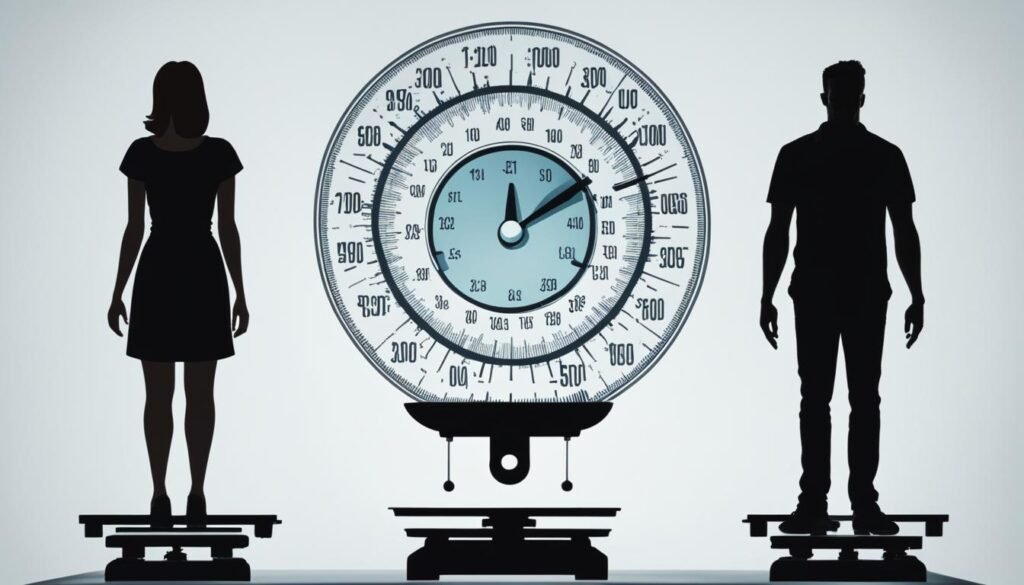Psychological stress is a common response to the pressures and demands of daily life. It can be triggered by various factors, including work, finances, relationships, and health issues. While it’s well-known that stress can impact mental well-being, many people are unaware of its surprising effect on weight.
Studies have shown that chronic stress can lead to weight gain or weight loss, depending on the individual’s response. Stress can disrupt normal eating behaviors, leading to stress eating or emotional eating, where individuals turn to unhealthy comfort foods for solace. This can contribute to weight gain over time. On the other hand, some individuals may experience stress-induced weight loss as a result of increased metabolism and energy expenditure (check out my post on stress-induced weight loss here).
The release of stress hormones, particularly cortisol, plays a crucial role in stress-related weight changes. Cortisol affects how the body processes and stores fat, as well as its impact on appetite and cravings. Chronically elevated cortisol levels can lead to an imbalance in food intake and fat storage, making weight management more challenging.
Understanding the relationship between psychological stress and weight is essential for effective weight management. By implementing stress reduction strategies and adopting healthy lifestyle habits, individuals can minimize the impact of stress on their weight and overall well-being.
Key Takeaways:
- Psychological stress can lead to weight gain or weight loss.
- Stress can disrupt eating behaviors, leading to stress eating or emotional eating.
- Chronic stress can result in imbalanced cortisol levels, affecting fat storage and appetite.
- Understanding stress and its impact on weight is crucial for effective weight management.
- By implementing stress reduction strategies and adopting healthy lifestyle habits, individuals can manage stress-induced weight changes.
The Relationship between Stress and Obesity
Chronic stress has been consistently linked to obesity through numerous studies. When we experience stress, our bodies release hormones like cortisol that can contribute to weight gain. Research has shown that individuals who perceive higher levels of stress are more likely to be obese.
The prevalence of obesity is increasing worldwide, and there is a growing concern about the role of stress in this obesity pandemic. With the increasing levels of stress in modern society, it is believed to be a contributing factor to the rising rates of obesity.
Stress-induced weight gain is a complex issue influenced by various factors, including psychological, physiological, and behavioral aspects. Understanding the relationship between stress and obesity is crucial for developing effective strategies to manage weight and promote overall well-being.
| Key Factors | Impact on Obesity |
|---|---|
| Psychological factors: | Stress can lead to emotional eating and unhealthy food choices, contributing to weight gain. |
| Physiological factors: | Stress hormones like cortisol promote fat storage and alter metabolism, leading to weight gain. |
| Behavioral factors: | Stress can interfere with exercise routines and promote sedentary behaviors, which can contribute to weight gain. |
Understanding the relationship between stress and obesity is crucial for developing effective strategies for weight management.
By addressing stress and its impact on weight, individuals can take proactive steps towards maintaining a healthy weight and reducing the risks associated with obesity.
The Role of Cortisol in Weight Gain

Cortisol, often referred to as the stress hormone, plays a significant role in weight gain. When the body is under stress, cortisol is released to help the body respond to the stressor. However, chronic stress can lead to chronically elevated cortisol levels, which can disrupt the body’s metabolism and promote fat storage.
High levels of cortisol stimulate appetite and increase cravings for sugary and fatty foods, leading to increased caloric intake. This combination of elevated cortisol and unhealthy eating habits can contribute to weight gain and difficulty in losing weight.
Additionally, cortisol affects the distribution of fat in the body. It promotes the accumulation of visceral fat, which is fat stored around vital organs such as the abdomen. Visceral fat is associated with an increased risk of various health conditions, including cardiovascular disease, type 2 diabetes, and metabolic syndrome.
Understanding the impact of cortisol on weight gain is crucial for developing strategies to manage stress-induced weight gain effectively (check out my post on stress-induced weight gain here). By implementing stress management techniques and adopting healthy lifestyle habits, individuals can minimize cortisol levels and mitigate the negative effects of chronic stress on weight.
Effects of chronically elevated cortisol:
- Disruption of the body’s metabolism
- Promotion of fat storage
- Increased appetite and cravings for sugary and fatty foods
- Accumulation of visceral fat
Managing stress effectively through stress reduction strategies, such as regular exercise, meditation, and relaxation techniques, can help regulate cortisol levels and support healthy weight management. By understanding the role of cortisol in weight gain, individuals can take proactive steps towards achieving and maintaining a healthy weight.
The Impact of Stress on Eating Behaviors
Psychological stress can have a significant impact on eating behaviors. When people experience stress, they often turn to food as a form of comfort or emotional coping mechanism, a behavior commonly known as stress eating or emotional eating. This impulse typically leads to the consumption of high-calorie, sugary, and fatty foods that provide temporary relief.
Stress-induced food cravings are driven by the release of stress hormones like cortisol, which can increase appetite and promote the desire for comfort foods. These foods are often associated with a sense of nostalgia or familiarity, offering a comforting experience during times of stress. Common examples of comfort foods include ice cream, chocolate, chips, and fast food.
The association between stress and unhealthy food choices is a significant concern as it can contribute to weight gain and hinder weight loss efforts. These high-calorie foods consumed during stress episodes can lead to excess calorie intake and a disruption of normal eating patterns. Over time, this pattern can contribute to an unhealthy diet and the development of weight-related issues.
It is crucial to develop effective strategies to manage stress-related eating behaviors in order to maintain a healthy weight. Recognizing the triggers for stress-induced food cravings and finding alternative coping mechanisms can help break the cycle of emotional eating. Engaging in stress reduction techniques like deep breathing exercises, meditation, or seeking support from friends and family can also mitigate the tendency to turn to food during stressful times (check out my post on stress reduction techniques here).
Understanding the impact of stress on eating behaviors allows individuals to develop healthier coping mechanisms, make mindful food choices, and establish a balanced relationship with food that aligns with their weight management goals.
| Effect of Stress on Eating Behaviors | Result |
|---|---|
| Increased appetite and cravings for high-calorie, sugary, and fatty foods | Excess calorie intake leading to weight gain |
| Disruption of normal eating patterns | Unhealthy diet and difficulty in weight management |
| Association with comfort foods | Emotional satisfaction but potential negative health consequences |
Managing stress-related eating behaviors is essential for individuals striving to maintain a healthy weight and overall well-being.
The Effect of Stress on Metabolism

Psychological stress can have a profound effect on metabolism. When we experience chronic stress, our body’s normal metabolic processes can be disrupted, leading to changes in energy expenditure and nutrient metabolism. One key factor involved in stress-induced metabolic changes is cortisol, known as the stress hormone.
Cortisol plays a vital role in our body’s response to stress, helping us to mobilize energy and prepare for the perceived threat. However, prolonged stress can result in chronically elevated cortisol levels, which can interfere with our metabolism and contribute to weight gain.
Elevated cortisol levels can slow down our metabolism and reduce our energy expenditure. This means that even when we consume the same amount of calories, our body may not burn them as efficiently, leading to weight gain or difficulty in losing weight.
Furthermore, stress-induced metabolic changes can also affect how our body processes nutrients. Under stress, our body may prioritize storing energy as fat to ensure it has enough resources to deal with the perceived threat. This can lead to increased fat storage, especially around the abdominal region, which carries a higher risk of health complications.
To illustrate the impact of stress on metabolism, here is a table showcasing stress-induced metabolic changes:
| Metabolic Changes | Effects |
|---|---|
| Slowed metabolism | Decreased energy expenditure |
| Increased fat storage | Higher risk of obesity-related health complications |
| Altered nutrient processing | Disrupted energy balance |
Understanding the impact of stress on metabolism is crucial for developing effective weight management strategies. By addressing stress-induced metabolic changes, we can work towards restoring a healthy metabolism and promoting sustainable weight loss or maintenance.
Incorporating stress reduction techniques, such as relaxation exercises and mindfulness practices, can help alleviate stress and mitigate the negative effects on metabolism. Additionally, adopting a balanced diet and regular physical activity can support a healthy metabolism and facilitate weight management efforts.
The Role of Cortisol in Weight Loss

While cortisol is often associated with weight gain, it can also play a role in weight loss. In response to stress, cortisol is released to mobilize stored energy and provide the body with the resources it needs to respond to the stressor. This can lead to an increase in energy expenditure and fat burning.
Increased cortisol levels stimulate the body to break down stored glycogen and fat, converting them into energy for immediate use. This process is essential during stress-induced weight loss, where the body needs extra energy to cope with the stressful situation.
Furthermore, cortisol promotes lipolysis, the breakdown of stored fat, and allows fatty acids to enter the bloodstream. This is crucial for energy production during stressful situations and contributes to weight loss.
However, it’s important to note that chronic stress and elevated cortisol levels can disrupt the body’s ability to effectively burn fat. Prolonged exposure to stress hormones can lead to insulin resistance and metabolic dysregulation, making weight loss more challenging.
By understanding the role of cortisol in weight loss, we can develop strategies to manage stress-induced weight gain and promote healthy weight loss. These strategies may include stress management techniques, such as mindfulness meditation or deep breathing exercises, to reduce cortisol levels and mitigate its effects on fat storage.
Strategies for Stress Reduction

Managing stress is vital for maintaining a healthy weight and overall well-being. There are various stress reduction strategies and techniques that can help alleviate stress and promote a balanced lifestyle.
1. Practice relaxation techniques:
Deep breathing exercises and meditation can help calm the mind and relax the body. Taking deep breaths, focusing on the breath, and engaging in mindfulness practices can reduce stress levels and promote a sense of calm.
2. Engage in regular physical activity:
Exercise is a powerful stress reducer. Engaging in regular physical activity, such as walking, jogging, or practicing yoga, can help release endorphins and reduce stress hormones. Aim for at least 30 minutes of exercise most days of the week.
3. Get enough sleep:
Adequate sleep is essential for stress management. Aim for 7-8 hours of quality sleep each night. Establish a relaxing bedtime routine and create a comfortable sleep environment to promote better sleep.
4. Maintain a healthy diet:
Eating a well-balanced diet can support stress reduction. Include plenty of fruits, vegetables, whole grains, and lean proteins in your meals. Avoid excessive consumption of sugary, fatty, and processed foods, as they can contribute to increased stress levels.
5. Seek social support:
Building strong social connections and seeking support from loved ones can help alleviate stress. Talk to family and friends about your feelings and concerns, and consider joining support groups or seeking professional help if needed.
By implementing these stress reduction tips and techniques into your daily routine, you can effectively manage stress levels, improve overall well-being, and support your weight management goals.
| Stress Reduction Strategies | Benefits |
|---|---|
| Practice relaxation techniques | Calms the mind and relaxes the body |
| Engage in regular physical activity | Reduces stress hormones and releases endorphins |
| Get enough sleep | Promotes stress management and overall well-being |
| Maintain a healthy diet | Supports stress reduction and balanced nutrition |
| Seek social support | Provides emotional support and fosters connection |
The Impact of Stress on Mental Health

Stress can have significant negative effects on mental health. Chronic stress can lead to increased levels of anxiety and depression, as well as other mental health disorders. When stress levels become overwhelming, it can be difficult to maintain a healthy emotional state, which can further exacerbate weight management challenges.
Individuals experiencing high levels of stress often resort to unhealthy coping mechanisms, such as emotional eating, as a way to find temporary relief. Unfortunately, this can create a vicious cycle, as emotional eating can contribute to weight gain and further intensify feelings of stress and anxiety.
The psychological effects of stress on mental health can make weight management more challenging. It’s crucial to address both the physical and emotional aspects of well-being when developing holistic approaches to weight management.
“Chronic stress can take a toll on a person’s mental health, often resulting in increased anxiety and depression.” – Dr. Sarah Thompson, Psychologist
To effectively manage weight in the presence of stress, it’s important to prioritize mental health by incorporating stress reduction techniques. Taking breaks, practicing mindfulness, seeking therapy or counseling, and engaging in activities you enjoy can help alleviate the psychological effects of stress.
By addressing stress and mental health as integral components of weight management, individuals can establish a healthier relationship with food, make better choices, and improve overall well-being.
The Link Between Stress and Anxiety
Stress often goes hand in hand with anxiety. When individuals experience stress, their bodies go into a heightened state of alertness, leading to feelings of anxiety. Chronic stress can intensify these feelings and make it difficult to manage anxiety effectively.
- Excessive worrying and ruminating
- Restlessness and irritability
- Difficulty concentrating
- Sleep disturbances
- Physical symptoms like headaches and muscle tension
It’s important to recognize the role that stress plays in anxiety, as managing stress can help alleviate anxiety symptoms and improve overall mental well-being.
Stress and Depression: Understanding the Connection
Chronic stress can also contribute to the development or worsening of depression. The constant strain and pressure of stress can exhaust a person mentally and emotionally, leading to feelings of sadness, hopelessness, and a lack of interest in previously enjoyed activities.
It’s essential to address stress and its impact on mental health to prevent the escalation of depressive symptoms. Seeking professional help, practicing self-care, and fostering a supportive environment are all vital steps in managing stress and reducing the risk of depression.
The Long-Term Effects of Stress and Weight Gain

Long-term stress and weight gain can have significant implications for overall health. When stress becomes chronic, it can lead to a range of health complications, with weight gain being one of the potential consequences. This section explores the long-term effects of stress and weight gain, shedding light on the associated health risks.
Chronic stress and weight gain have been linked to various health complications, including:
- Cardiovascular disease
- Metabolic disorders like type 2 diabetes
- Cancer
- Joint pain
- Fertility problems
- Respiratory disorders
- Mental health issues
Understanding the long-term effects of stress and weight gain is crucial in developing preventive measures, early intervention strategies, and comprehensive weight management programs. By addressing the risks associated with chronic stress-induced weight gain, individuals can take proactive steps to safeguard their health and well-being.
| Long-Term Effects of Stress and Weight Gain | Health Complications |
|---|---|
| Cardiovascular Disease | Increased risk of heart attacks, strokes, and hypertension |
| Metabolic Disorders | Higher likelihood of developing type 2 diabetes and insulin resistance |
| Cancer | Increased susceptibility to certain types of cancer |
| Joint Pain | Greater incidence of arthritis and other joint-related issues |
| Fertility Problems | Reduced chances of conception and increased reproductive health risks |
| Respiratory Disorders | Higher incidence of asthma, chronic obstructive pulmonary disease (COPD), and other respiratory conditions |
| Mental Health Issues | Increased prevalence of anxiety disorders, depression, and other psychological conditions |
The Impact of the COVID-19 Pandemic on Stress Levels and Weight Management

The ongoing COVID-19 pandemic has brought about unprecedented levels of stress and anxiety worldwide. The combination of social isolation, financial uncertainty, and health concerns has significantly impacted the mental well-being of individuals. As a result, stress levels during the pandemic have soared, leading to detrimental effects on weight management.
The pandemic-related stressors have created a perfect storm for weight gain or hindered weight loss efforts. The disruption to daily routines and limited access to exercise facilities have contributed to increased sedentary behavior. With gyms closed and limited outdoor activities, individuals have experienced challenges in maintaining their physical fitness levels.
Furthermore, changes in eating patterns during the pandemic have further complicated weight management. The stress-induced emotional eating and the reliance on comfort foods have become more prevalent as people search for solace or distraction from the uncertainties of the current situation. Such choices in food, often high in calories and lacking essential nutrients, can lead to weight gain or hinder weight loss progress.
Understanding the impact of the COVID-19 pandemic on stress levels and weight management is crucial for developing effective strategies. By addressing the unique challenges posed by the current situation, individuals can mitigate the negative consequences on their physical and mental well-being.
Strategies for Stress Management:
- Practice relaxation techniques such as deep breathing exercises and meditation
- Engage in regular physical activity
- Get enough sleep to support overall well-being
- Maintain a healthy and balanced diet
- Take breaks from the news and social media to avoid information overload
- Seek social support from friends and family
Weight Management Strategies During the Pandemic:
- Create a structured daily routine that includes time for exercise
- Find creative ways to stay active at home, such as online workout classes or home workouts
- Plan and prepare healthy meals and snacks in advance
- Limit the consumption of highly processed and unhealthy foods
- Practice mindful eating, focusing on hunger and fullness cues
- Stay hydrated and limit sugary drinks
“The COVID-19 pandemic has brought about immense challenges, affecting both stress levels and weight management. By implementing stress reduction techniques and adopting healthy lifestyle habits, individuals can navigate through these difficult times while prioritizing their overall well-being.” – The Impact of the COVID-19 Pandemic on Stress Levels and Weight Management
Can Psychological Stress Cause Weight Fluctuations?
Yes, the role of stress weight fluctuations can certainly be significant. Psychological stress can lead to weight fluctuations, as it can trigger emotional eating, disrupt sleep patterns, and affect hormone levels. These factors can contribute to both weight gain and loss, making stress management an important aspect of maintaining a healthy weight.
Conclusion
Psychological stress has a profound impact on weight, influencing both weight gain and weight loss. Chronic stress can lead to unhealthy weight gain as it disrupts hormonal balance and triggers changes in eating behaviors. Effective stress management is crucial for maintaining a healthy weight and overall well-being.
Strategies such as relaxation techniques, regular physical activity, and a nutritious diet can help mitigate the effects of stress on weight. It is essential to understand the complex relationship between stress and weight in order to develop comprehensive weight management plans that address both physical and emotional factors.
By adopting stress reduction strategies and implementing healthy lifestyle habits, individuals can promote their well-being and effectively manage their weight. Prioritizing stress management alongside weight management is key to achieving optimal health.




